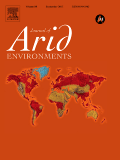
Journal of Arid Environments
Scope & Guideline
Exploring the Dynamics of Arid Ecosystems
Introduction
Aims and Scopes
- Ecological Dynamics in Arid Regions:
The journal emphasizes research on the interactions between species and their environments in arid ecosystems, exploring how these dynamics influence biodiversity, community structure, and ecological processes. - Climate Change Impacts:
A core focus is on understanding how climate change affects arid environments, including shifts in species distributions, phenological changes, and the resilience of ecosystems to extreme weather events. - Water Management and Conservation:
The journal addresses the challenges of water scarcity in arid regions, investigating innovative management strategies, water harvesting techniques, and the ecological implications of water use. - Human-Environment Interactions:
Research on the socio-economic dimensions of arid regions, including the impacts of land use, traditional practices, and conservation strategies on local communities and ecosystems. - Biodiversity and Conservation Strategies:
The journal promotes studies on the conservation of endemic and endangered species, habitat restoration, and the role of protected areas in maintaining biodiversity in arid landscapes. - Technological Applications in Arid Research:
The use of remote sensing, GIS, and modeling approaches to study and manage arid environments is a significant aspect, facilitating data-driven insights into ecological patterns and processes.
Trending and Emerging
- Climate Resilience and Adaptation Strategies:
There is a growing emphasis on research that explores the resilience of arid ecosystems and communities to climate change, including adaptive strategies and mitigation measures. - Interdisciplinary Approaches to Ecosystem Management:
An increase in interdisciplinary studies that integrate ecological, social, and economic perspectives for effective management and restoration of arid environments is notable. - Technological Innovation in Environmental Monitoring:
The application of advanced technologies, such as remote sensing and machine learning, for monitoring environmental changes and managing resources in arid regions is gaining traction. - Socioeconomic Impacts of Climate Change:
Research focusing on how climate change affects local communities, livelihoods, and traditional practices in arid regions is emerging as a critical area of study. - Biodiversity Assessment and Conservation Genomics:
There is a trend towards utilizing genomic tools and techniques for assessing biodiversity and developing conservation strategies for endemic species in arid landscapes.
Declining or Waning
- Traditional Agricultural Practices:
Research on traditional farming methods in arid areas has decreased, possibly due to a shift towards exploring innovative agricultural technologies and sustainable practices that enhance productivity under climate stress. - Historical Ecological Studies:
While historically significant, the focus on archaeological and historical ecology in arid environments has waned, as contemporary ecological issues and climate change impacts take precedence. - Invasive Species Studies:
Though still relevant, the frequency of papers specifically addressing the impacts of invasive species in arid environments appears to be declining, with a shift towards broader ecological interactions and management strategies. - Soil Erosion Studies:
Research dedicated solely to soil erosion dynamics in arid regions has become less prominent, overshadowed by more integrative studies that encompass various ecological factors affecting soil health. - Species-Specific Studies:
There seems to be a reduction in narrowly focused studies on specific species, as the journal increasingly favors broader ecological and community-level analyses.
Similar Journals
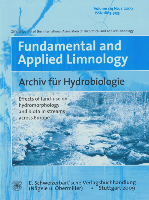
Fundamental and Applied Limnology
Discovering Biodiversity: Essential Insights for Ecological ProgressFundamental and Applied Limnology is an esteemed academic journal dedicated to the exploration of freshwater ecosystems, bridging the gap between fundamental research and practical applications. Published by E Schweizerbart'sche Verlagsbuchhandlung in Germany, this journal has been a vital resource in the fields of aquatic science and ecology since its inception in 2007. With its ISSN 1863-9135 and E-ISSN 1863-9135, it provides a platform for researchers to disseminate significant findings related to limnology, contributing to a rich understanding of freshwater biodiversity, water quality, and ecological interactions. Although currently rated in the Q3 quartile for aquatic sciences and ecology as per the 2023 rankings, it remains a valuable outlet for interdisciplinary research and practical insights, facilitating critical advancements in environmental management. Open access options enhance its visibility and accessibility, making it indispensable for researchers, professionals, and students alike who are committed to advancing the scholarship in freshwater studies. Engaging with this journal not only opens doors to the latest research findings but also fosters collaboration and innovation in the ecological community.
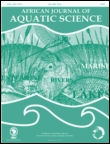
AFRICAN JOURNAL OF AQUATIC SCIENCE
Empowering research to protect our vital water resources.AFRICAN JOURNAL OF AQUATIC SCIENCE, published by TAYLOR & FRANCIS LTD, is a premier scholarly journal dedicated to the field of aquatic science, ecology, and environmental management, playing a crucial role in advancing research and knowledge in these vital areas. With an impressive Q2 ranking in both Aquatic Science and Ecology, Evolution, Behavior and Systematics, the journal seeks to publish high-quality research encompassing a wide range of topics related to freshwater and marine ecosystems, including biodiversity, conservation strategies, and the impacts of climate change. Featuring a rich history of publication from 2000 to 2024, the journal not only embraces rigorous peer review but also aims to foster collaboration and dialogue among researchers, practitioners, and students interested in aquatic environments. Readers will find that the journal’s commitment to impactful scientific communication is reflected in its notable rankings within the Scopus database, making it an essential resource for those engaged in aquatic research and management.

Neotropical Biodiversity
Advancing knowledge for a thriving Neotropical future.Neotropical Biodiversity is a prominent journal dedicated to advancing our understanding of biodiversity and ecological dynamics within the Neotropical region. Published by TAYLOR & FRANCIS LTD in the United Kingdom, this Open Access journal has been providing unrestricted access to research findings since 2015, fostering collaboration and knowledge sharing among the global scientific community. With an emphasis on innovative research in Ecology, Ecology, Evolution, Behavior and Systematics, and Global and Planetary Change, it has earned a reputation for excellence, currently holding a Q3 category in its field. As of 2023, the journal ranks in the 37th percentile for Environmental Science (Ecology) and in the 36th percentile for Agricultural and Biological Sciences (Ecology, Evolution, Behavior and Systematics), making it a valuable resource for researchers, professionals, and students interested in understanding and preserving biodiversity in one of the world's most diverse ecosystems. We invite you to explore the cutting-edge research published in Neotropical Biodiversity and contribute to the ongoing dialogue for environmental sustainability and ecological resilience.

Annual Review of Ecology Evolution and Systematics
Synthesizing Knowledge for a Sustainable FutureThe Annual Review of Ecology, Evolution, and Systematics, published by Annual Reviews, is a leading academic journal dedicated to advancing the understanding of ecological and evolutionary processes. With a commendable impact factor and impressive rankings—9th in both the Ecology, Evolution, Behavior and Systematics category and the Environmental Science category—this journal is recognized for its rigorous peer-reviewed articles that synthesize research findings across a wide range of topics within the fields of ecology and evolutionary biology. Established in 2003, this annual publication aims to provide researchers, professionals, and students with comprehensive insights into the latest developments and trends within these dynamic disciplines. By facilitating access to high-quality scholarly articles, the Annual Review of Ecology, Evolution, and Systematics continues to play a crucial role in fostering scientific discourse and discovery.
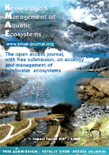
Knowledge and Management of Aquatic Ecosystems
Advancing Solutions for Sustainable Aquatic EcosystemsKnowledge and Management of Aquatic Ecosystems, published by EDP SCIENCES S A, is a premier open-access journal dedicated to the interdisciplinary study of aquatic ecosystems. With an ISSN of 1961-9502 and an impressive history since 1928, this journal serves as a vital resource for researchers and professionals in the fields of Ecology, Aquatic Science, Water Science and Technology, and Nature Conservation. The journal has consistently achieved high rankings, including a Q2 classification in multiple categories, which underscores its significant contribution to the evolving landscape of aquatic research. With access options that promote widespread dissemination of knowledge, Knowledge and Management of Aquatic Ecosystems aims to bridge gaps in research, policy, and practical applications, making it an invaluable asset for students, researchers, and policymakers aiming for impactful solutions in aquatic management and conservation.
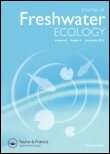
JOURNAL OF FRESHWATER ECOLOGY
Cultivating a global dialogue on aquatic sustainability.JOURNAL OF FRESHWATER ECOLOGY, published by Taylor & Francis Inc, is an esteemed source of research dedicated to advancing the understanding of freshwater ecosystems. Established in 1981, this Open Access journal has provided a platform for innovative studies and groundbreaking articles relevant to the fields of Aquatic Science and Ecology. With its HIndex reflecting a commitment to quality scholarship, the journal is currently classified in the Q3 category for both Aquatic Science and Ecology, Evolution, Behavior and Systematics, indicating its respectable impact within these disciplines. The journal ranks within the 45th percentile in Ecology and the 41st percentile in Aquatic Science on Scopus, highlighting its relevance to a global audience of researchers and practitioners. By facilitating unrestricted access to research findings since 2017, JOURNAL OF FRESHWATER ECOLOGY aims to enrich our understanding of freshwater systems and their conservation, making it an essential resource for those invested in ecological research and environmental sustainability.
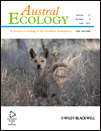
AUSTRAL ECOLOGY
Unveiling the future of ecology through rigorous research.AUSTRAL ECOLOGY, published by WILEY, is a key journal in the field of ecology, with a focus on ecological research from the Southern Hemisphere and beyond. With an ISSN of 1442-9985 and an E-ISSN of 1442-9993, this journal serves as a vital platform for the dissemination of significant findings related to ecology, evolution, behavior, and systematics. Currently holding a commendable Q2 ranking in both Ecology and Ecology, Evolution, Behavior and Systematics categories as of 2023, AUSTRAL ECOLOGY is recognized for its rigorous peer-review process and impactful research contributions, as evident from its Scopus rankings in the 56th percentile for both Agricultural & Biological Sciences and Environmental Science. Researchers, professionals, and students engaged in ecological studies can benefit from the journal's open access options, enabling wider accessibility to critical ecological insights and advancements in the field. Established in 1981, with an evolving legacy through its converged years from 1996 to 2024, AUSTRAL ECOLOGY remains committed to advancing ecological knowledge and fostering a deeper understanding of ecological dynamics in our ever-changing environment.
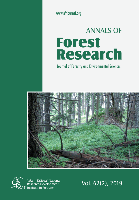
Annals of Forest Research
Connecting scholars to foster environmental stewardship.Annals of Forest Research is a peer-reviewed journal dedicated to advancing knowledge in the fields of forestry, ecology, and plant sciences. Published by EDITURA SILVICA in Romania, this journal has been an open access publication since 2008, providing a platform for researchers to share their insights and findings with a global audience. The journal operates under a rigorous selection process, reflected in its positioning within the Q2 category in Forestry and Q3 in both Ecology and Plant Science as of 2023. With Scopus rankings indicating a solid percentile among its peers, Annals of Forest Research continues to play a vital role in disseminating innovative research and fostering scholarly dialogue. Researchers, professionals, and students are encouraged to explore its diverse range of articles, which address both foundational and contemporary issues in forest management and environmental sustainability, contributing to the sustainable use and preservation of forest ecosystems.
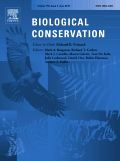
BIOLOGICAL CONSERVATION
Transforming Conservation Strategies Through Rigorous Research.BIOLOGICAL CONSERVATION, published by Elsevier Science Ltd, is a leading international journal dedicated to advancing the science and practice of biological conservation. Since its inception in 1968, the journal has provided a critical platform for researchers, professionals, and students in the fields of Ecology, Evolution, Behavior, and Systematics as well as Nature and Landscape Conservation. With an impressive impact factor, and ranked in the Q1 category within both ecological and conservation domains in 2023, it emphasizes high-quality empirical and theoretical research essential for understanding and addressing pressing environmental challenges. Although it follows a subscription model, the journal is known for its rigorous peer-reviewed articles that contribute significantly to the field, ensuring that the latest findings and methodologies are readily accessible to practitioners. As a vital resource for those engaged in conservation efforts globally, BIOLOGICAL CONSERVATION stands out for its commitment to enhancing knowledge and informing strategies that safeguard biodiversity across ecosystems.
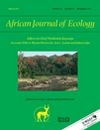
AFRICAN JOURNAL OF ECOLOGY
Unveiling the Secrets of African EcosystemsThe African Journal of Ecology, published by Wiley, is a leading academic journal in the field of Ecology, Evolution, Behavior, and Systematics. Established in 1963 and continuing its vital contributions to the field until 2024, this journal serves as a premier platform for researchers and scholars to share groundbreaking studies that explore the intricate relationships within ecosystems, particularly in the African context. With an impressive Scopus Rank of #423 out of 721 and a Q3 Quartile ranking, it stands as a credible source of scholarly information, gaining recognition among peers for its rigorous peer-review process and impactful publications. While the journal is not open access, it remains influential in driving advancements in ecological research and providing insights vital for conservation efforts and biodiversity studies. Authors and readers alike will find that the African Journal of Ecology not only promotes scientific inquiry but also fosters a deeper understanding of ecological dynamics that affect our world.